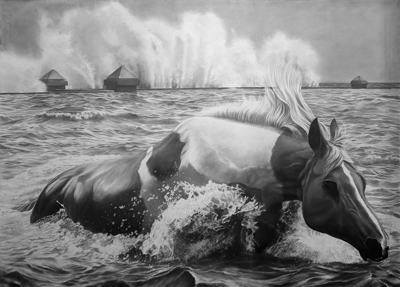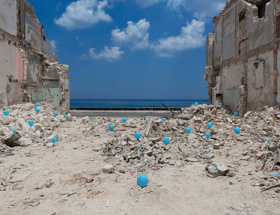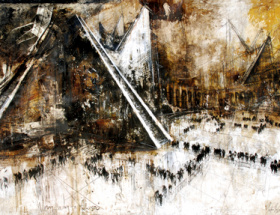Sketches of Nostalgia
By Antonio Correa Iglesias
“What ancestors speak in me? I cannot live at the same time in my head and in my body. That is the reason why I cannot be just one person. I can feel in myself an infinity of things simultaneously. The real evil of our time is that there are no great teachers left”.
Erland Josephson [final monologue]. Nostalgia, Andrei Tarkovski, 1983
Like Erland Josephson, Lázaro Ramón Falcón stokes his fire and burns with inescapable slowness in the absence of great masters. What is left after the denial? What remains after critical thinking? Where to grab? Is there a place to hold on?
I learned about the work of Lázaro R Falcón through the concurrent chance, as José Lezama Lima called it. At that moment I perceived in his work a codification and somatization of the retroprogressive experience, the one Nietzsche called the eternal return.
Falcón’s painting reminds me of a sort of cave exploration toward the interior of a lost individuality. Altamira vociferates its symbolic traces in his gestures, anticipated glimpses of a pre-linguistic conscience.
Unlike a certain Cuban painting, Lázaro Ramón Falcón avoids every mannierism anchored in tradition and secularity while refusing all conciliatory and canonical morphology.
Falcón cannot, no matter how hard he tries –like Narcissus– to articulate the contemplation of himself, like others who mock in the haze of his detritus-work inflated with heritage. Falcon’s work is a stain on the symbolic stability of others; it cuts into the orderly world of physics and the geometrics of experience. His irreverence “denies” all reference and tradition. The phallic element, for example, is an argument, from the violence it suggests to the morbid hallucination of pleasure, a pleasure that fades in the face beset with teleological hedonism. The phallic experience in Falcón anticipates and recalls western phallus-centrism, a counterpoint that evidences the primary glimpse of the conscience, the same one that separates us from animals. Lázaro Ramón Falcón forces (with his stroke sublimated by vertigo) the surprise in his visual links, the sketch of a narrative turn where time vanishes because it has been canceled. To trace this force that embodies images is an entirely free exercise of knowledge, a genealogical reason that reinforces a chaotic world with ontological consequences.
The nostalgia distilled by the work of Lázaro R Falcón can lead us to a reflection on the essential unity where there was no difference between thought and language, where things did not have to be named to be called. The pathological anguish of this “search” for lost time induces a rusty sensation where Falcón offers his neck as Saint Dionysius of Paris who, decapitated, was kissing his head. It is true that Lázaro Ramón Falcón looks for something he does not pursue; it is also true that the disturbing and anodyne plenitude of his painting –thick paint– underscores the riddle that gives way to a visuality loaded with suffocating mystery.
If the intensity of the shades recalls the strength of the blood, the “neutral” planes come to reinforce the expressionist will of a creator who, pulling the strings of a will has generated a spatial island that disconcerts in its morphology. Falcón ironizes the line, filling it to the extreme of a seldom teleological causality.
Although the volume of his painting is safely kept in Spain, his drawings in small format are like the Goya’s Caprices and Cervantes’s Short Farces, small jewels consumed Etruscan culture: at intervals of silence.
At the same time, Falcon’s work places us squarely before the riddle of meaning. Colin McGinn, who has addressed the links of expressionism, but above all abstract expressionism and the theories of meanings, recognizes that the search for the signifier is ultimately a human decision. However, for McGinn in the semantics of any language there is an inherent tone that goes beyond any meaning. If this search is a human decision, there is no reason to believe that the con temporary language in art, or any language, does not implicitly have its own codes, established in the tone of meaning. This interception is precisely the entrance for the analysis and inference ability of those who participate in the semiological construction of the work. This is perhaps the most influential value of contemporary art and, by extension, of the work of Lázaro Ramón Falcón.
Amid these impulses –I imagine– is a work that outlines the nostalgia of a lost time. Its gregarious search exhumes the rusted and forgotten skeleton to give way to the primaryimpulse of the conscience. Like Erland Josephson, Lázaro Ramón Falcón throws his demands to the world in order to absorb, with the cynicism of one who knows himself wise, the perplexity of the other who, dislocated, burns at his feet.



